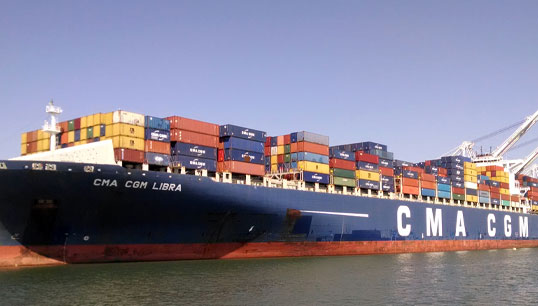- Topics
- Campaigning
- Careers
- Colleges
- Community
- Education and training
- Environment
- Equality
- Federation
- General secretary message
- Government
- Health and safety
- History
- Industrial
- International
- Law
- Members at work
- Nautilus news
- Nautilus partnerships
- Netherlands
- Open days
- Opinion
- Organising
- Podcasts from Nautilus
- Sponsored content
- Switzerland
- Technology
- Ukraine
- United Kingdom
- Welfare

A case that dragged on for 10 years shows it is in the owner's best interests to blame the master and crew for accidents after vessel departure, maritime consultant Ulrich Jurgens writes
The recent UK Supreme Court (UKCS) decision on the CMA CGM Libra case has generated huge internet traffic – a likely indicator of the judgment's importance to the shipping industry.

The judgment confirmed rulings by the UK Court of Appeal and the Admiralty Court, and as a UKSC decision, it cannot be appealed. The ruling has statutory character, and even if the UK parliament wanted to change the law, it could not, as it involves the Hague Rules, which are beyond its reach.
The Hague Rules are an international convention fixing certain uniform rules of law relating to bills of lading. Depending on the circumstances, those rules allocate, restrict or exclude liability of carrier and ship.
The Hague Rules are from 1924 and an amended version (the Hague-Visby Rules) has existed since 1968. The seaworthiness obligation is in the same terms in both instruments.
According to the UKSC, the appeal 'concerns the scope of a shipowner's obligation to exercise due diligence to make a vessel seaworthy' under those rules.
The Hague Rules, however, talk about the 'carrier', which may not be the same person or entity as the shipowner, so we should be aware that any liability restriction under the Hague Rules may not apply to an owner. In practice, though, shipowners commonly incorporate the liability terms of the Hague Rules through a 'Clause Paramount' into their charter parties, and 'carrier' can be understood to include 'owner'.
The decision clearly demarcates the liability for loss of either the owner or cargo interests (usually the charterer). The judgment's impact will extend far beyond the borders of the UK, given that English law is frequently chosen to settle international cargo and ship damage claims.
In assessing their personal risk, the master of a cargo-carrying vessel can therefore assume that their owner, ship and own role will be affected by the Hague Rules when damage to cargo or ship occurs.
The owner has their P&I Club and lawyers for liability cover and criminal defence. But those available funds and expertise will only benefit the master when it helps the owner
Facts of the case
The facts of the CMA CGM Libra case are rather simple. In brief and very broad terms, a container vessel is deliberately navigated off its passage plan course and grounds on an uncharted shoal. A note on the paper chart referred to a preliminary Notice to Mariners without saying what this contained. The Admiralty Court at first instance therefore found that when leaving the port of Xiamen, 'a source of danger was not clearly marked as it ought to have been'. The salvage cost resulting from the grounding was some US$9.5 million.
The vessel flew and still flies the Maltese flag. A maritime incident investigation report about the grounding cannot be found on the Maltese Administration's website, and an email request for a copy of the report was not answered.
Seaworthiness
Seaworthiness of ships is a term which trips easily off the tongue in shipping and seafaring circles but may mean different things to different people and will also depend on the relevant context.
In the UK, the duty to make the ship seaworthy is also addressed in section 42 of the UK Merchant Shipping Act 1995 (MSA 95) but it is not quite the same as the obligation under the Hague Rules.
First, the MSA 95 requirement applies to UK ships only. Secondly, both owner and master have the implied obligation that in every contract of employment they 'shall use all reasonable means to ensure the seaworthiness of the ship for the voyage at the time when the voyage commences and to keep the ship in a seaworthy condition for the voyage during the voyage'. Thirdly, for example, a locally required document which may make the ship unseaworthy under the Hague Rules may not have any effect on the seaworthiness requirement of the MSA 95.
The UKSC only dealt with seaworthiness for the Maltese-flagged CMA CGM Libra under the Hague Rules.
Responsibility
Those Rules require in Art. 3 that 'the carrier shall be bound before and at the beginning of the voyage to exercise due diligence to … make the ship seaworthy'. According to the UKSC, therefore, 'the carrier will be liable for a negligent act of navigation or management which causes the vessel to become unseaworthy before and at the beginning of the voyage, but not so liable if the same act does so after the voyage has commenced'.
The UKSC confirmed that the Hague Rules import different liabilities at different times (calling it 'temporality'). However, it was also stressed that, regardless of who may have carried out a task before the vessel sets sail, it will be the owner who will be liable for the lack of due diligence. This, by default, excludes the master, but the master's position is mentioned in the next Article.
Article 4 covers events potentially occurring after departure when several liability exemptions apply to owner and ship. For example, neither owner nor ship are responsible for loss or damage arising or resulting from an act of the master, or the servants of the owner, in the navigation or management of the ship.
Pressure
On the CMA CGM Libra, the master and his officers (the 'servants') made two errors. Firstly, they did not follow the IMO Guidelines for Voyage Planning. According to the Admiralty Court it would have been required that 'the presence of numerous depths less than those charted outside the fairway to be noted on the chart'. Thus, the passage plan which had to be prepared before the vessel sailed was defective.
The second error was made when the ship left the planned route and navigated outside the fairway to save a few minutes. Thereby it entered a danger area of uncharted wrecks and isolated shoals, and then grounded.
Whereas the owner was found to be liable for the first error of the master, owners could have in principle excluded their liability for the second error. However, the first breach was causative for the second, as neither the passage plan nor the chart contained the necessary warning. Consequently, the grounding 'was caused by the actionable fault of the owners' as the Admiralty Court put it.
Interests
What does this mean for master and crew? To find out I will first look at the interests of an owner before addressing the same for master and crew.
An owner (or their P&I Club) will usually and understandably do everything possible to avoid being held accountable and liable. It follows that it is potentially of great benefit to an owner when in case of cargo loss or damage, the error cannot be traced back to an event before the voyage began. Rather, it is in the owner's interest to prove their master or crew made an error in the navigation or management of the ship after departure. Under civil law the owner would then not be liable, and neither would the master or crew.
Particularly for the master, though, such relief can come at a heavy price, because the owner's (or P&I Club's) investigation may be the first step that pushes the master into the realm of criminal liability.
If, for example, the CMA CGM Libra grounding were to happen on a UK-flagged ship, the Merchant Shipping (Safety of Navigation) Regulations 2020 would apply. These make it an offence by the master, punishable on summary conviction or indictment, not to comply with the voyage planning requirements of SOLAS. It is also an offence under the Maltese Merchant Shipping (Safety Convention) Rules.
Criminals
SOLAS makes it mandatory for the voyage plan to identify a route which ensures sufficient sea room for the safe passage of the ship. By default, a grounding proves the opposite.
The groundwork for criminal proceedings against the master may be laid when the collection of evidence begins immediately after the incident. At that moment, a master appears to personally be at their most vulnerable and might also not be clear thinking. Confronted with, for example, representatives of owner or manager, surveyors, inspectors, investigators, P&I Club, lawyers, the police and the media, the master may make statements which they later regret.
In the UK, criminal liability for the owner is different to that of the master. Under the Safety of Navigation Regulations, only the master will have committed an offence and may face fines or imprisonment. The owner, though, may have helped that to happen by attempting to push the responsibility for the incident onto the master for errors in navigation and management of the ship after departure.
Co-operation and trust between owner and master, core components of any master's employment contract, could decline or disappear. Being sacked by the owner is, therefore, an additional realistic consequence for the master and affected officers.
Whereas a charterer will only want to prove that the reason for the loss can be found before departure, irrespective of who could be blamed for it, the owner will want to find the master at fault after departure.
Legal support
Reliable support for masters to navigate the undetected administrative and legal shoals following an incident is vital. The owner has their P&I Club and lawyers for liability cover and criminal defence. But those available funds and expertise will only benefit the master when it helps the owner.
Unless independently wealthy, or protected by an organisation, a master has commonly no assets other than their savings and any property. With possible solicitor's fees of over £500 per hour (according to current UK government guidelines), costs for barrister and court plus a potential loss of income, the master's assets may evaporate very fast.
It does not seem sensible, therefore, to ask whether the annual Nautilus International membership rate of £300 for masters is affordable; the question appears to be whether it is affordable not to be a member of Nautilus.
Tags
